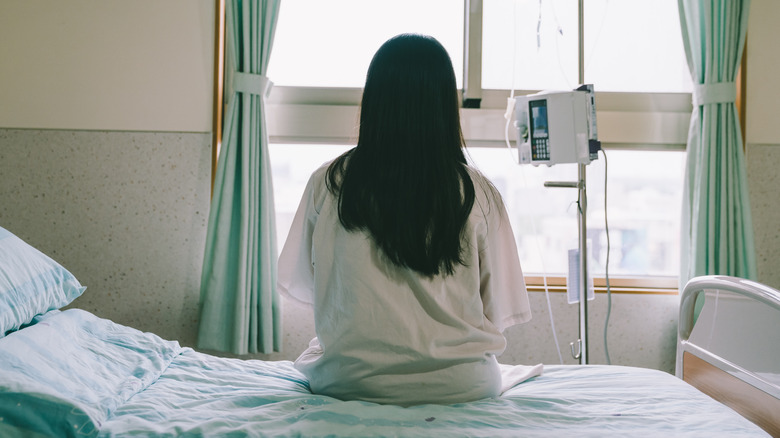What Happens To Your Eggs After A Partial Hysterectomy?
Among women in the U.S., hysterectomies are the second most common surgery after Cesarean sections, according to the Office on Women's Health. The procedure, which removes the uterus, makes it so that you'll no longer get a period or be able to have children. You might also have your fallopian tubes, ovaries, or cervix removed. But in some cases, these parts are left intact, sometimes known as a partial hysterectomy. So then, what happens to your eggs?
In a partial hysterectomy, the uterus is removed, but the cervix is left intact (via Healthline). Therefore, the bottom remains attached to your vagina, and the top is not attached to anything. The ovaries and fallopian tubes are usually left in place too. In that case, ovulating and regular hormonal fluctuations will continue, which means you won't go into menopause. In addition, you won't have a menstrual period since there's no uterine lining to shed. However, at times, you may still experience a small amount of bleeding each month because the cervix contains some of the cells found in the uterine lining. In fact, the space where your uterus previously was will be filled by the small and large intestines, which are the largest organs nearby.
The organs and abdomen after a hysterectomy
The ovaries are often left intact during a partial hysterectomy, even though they're no longer attached to the uterus (via Healthline). They stay in place within the abdomen because they're attached to the abdominal wall with a connective tissue called the suspensory ligament.
When the ovaries are left intact, and you haven't entered menopause yet, they continue to release hormones. They also keep releasing an egg each month. But with no uterus to enter, the eggs are released into the abdomen and ultimately disappear. In rare cases, eggs may still become fertilized and implant in a fallopian tube, known as an ectopic pregnancy, according to MedicineNet. An ectopic pregnancy requires emergency medical attention.
Some women receive hysterectomies when there are issues like uterine fibroids, endometriosis, heavy or unusual bleeding, or uterine prolapse (via Office on Women's Health). Since it's a major surgery, it's usually only considered when other options have been exhausted. A hysterectomy is also a possible treatment for those who have uterine, ovarian, cervical, or endometrial cancer. Depending on why your doctor is recommending the surgery, you may have a partial or total hysterectomy. Therefore, be sure to talk to your doctor about all of your options.


